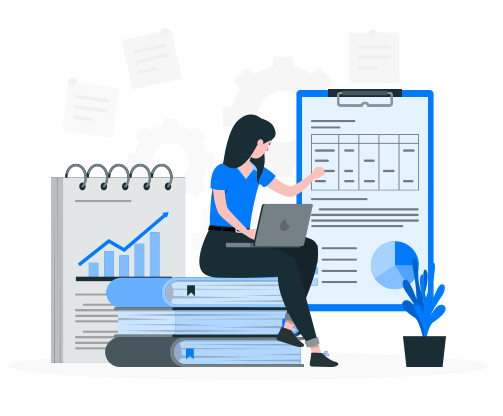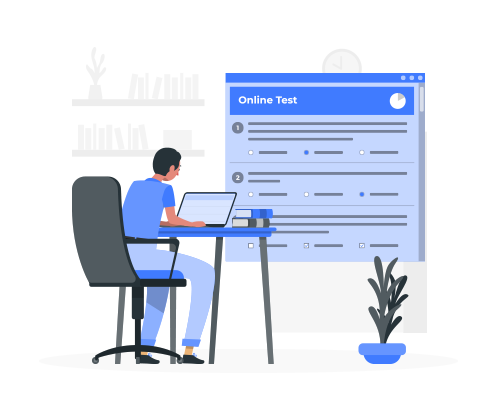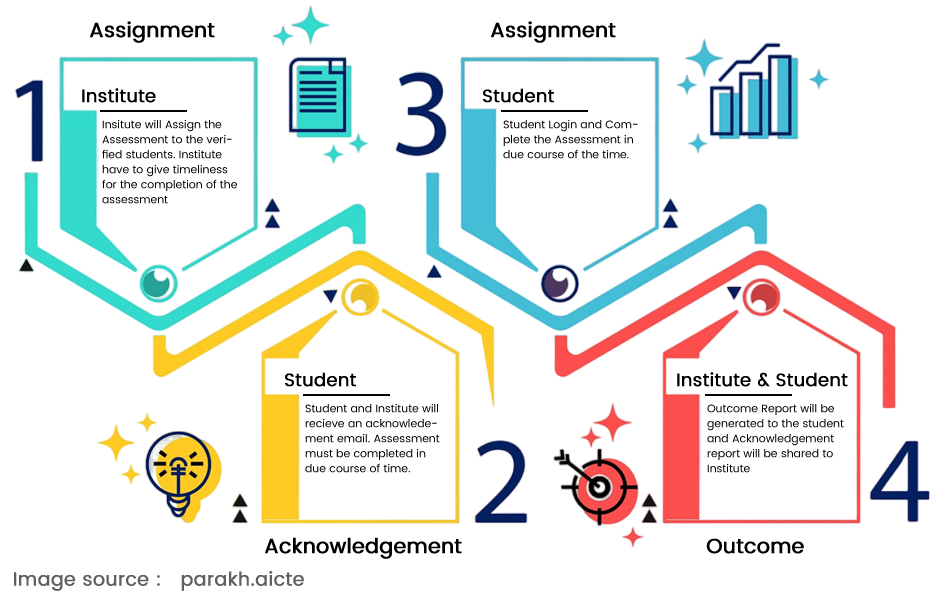NEP 2020: Revolutionizing Assessments For Holistic Student Development
TWe are a proven Edtech partner in sync with the latest NEP 2020 Assessment reforms and exams. These reforms stand as eminent in the nurturing of talent among the students. The NEP 2020 assessment reforms focus on shifting from traditional, rote memorization skills to:
- Regular, formative, and competency-based skills
- Holistic student development
- Mastery of higher-order skills
- Cognitive ability building for real-world challenges
- Continuous monitoring and optimization of learning

Embracing 360-Degree Multidimensional Progress Card
- Multidimensional progress card for school-based assessment, as per the National Education Policy (NEP) 2020.
- Progress card redesigning by States/UTs under guidance from the proposed National Assessment Centre, NCERT, and SCERTs.
- It depicts learners in the cognitive, affective, and psychomotor domains.
- Facilitate valuable communication between teachers and parents to support each student inside and outside the classroom.
- Equipped with assessment techniques that demonstrate student growth and progress.


NEP 2020-Assessment Methods for a Dynamic Educational Landscape
NEP 2020 suggests distinct assessment methods that nurture students' overall development, encourage critical thinking, and prepare them for the challenges of the 21st century. The various assessment methods are:
- Self and peer assessment: Reflect on student progress and feedback from their peers.
- Project & inquiry-based learning: Apply knowledge and skills in real-world contexts.
- Quizzes, role plays, group work, and portfolios: Showcase students' learning, problem-solving abilities, and creativity skills.
- Teacher assessments: Students' academic achievements and social-emotional development.
Leveraging AI for Student Growth Tracking
- Collect and analyze data related to the student learning journey.
- Continuously monitors and captures academic achievements, strengths, areas of improvement, learning patterns, and student engagement levels.
- Identify trends and patterns in students' progress over time.
- Educators and parents provide personalized learning support based on the learning gaps.
- Identify potential career paths aligned with the student's strengths and aspirations.

NEP 2020's Approach to Redesigning Board Exams
The major issue in current board exams is the overemphasis on rote memorization, which fails to address the student's critical thinking and problem-solving abilities.
NEP 2020 aims at re-structuring board exams with a few amendments such as:
- A deeper understanding of subjects promotes holistic development.
- Flexibility in choosing the subject of their interests.
- Tests primarily core capacities/ competencies rather than content memorization.
- Best of two attempts: One for the main exam and the other for improvement.
- The mode of exams will be annual/semester/modular, which reduces pressure on students.
- Redesigning of question papers in two parts: one is objective with MCQ, and the other is descriptive.
NCERT Guidelines and Empowering Education through PARAKH
- NCERT Guidelines in consultation with major stakeholders, such as SCERTs, Boards of Assessment (BoAs), and National Assessment Centre PARAKH.
- Annual exams for grades 3, 5, and 8 to test basic learning outcomes, higher-order skills, and application of knowledge in real-world contexts.
- PARAKH sets guidelines, norms, and standards for analyzing student learning outcomes.
- Parakh encourages schools to adopt new assessment patterns of the 21st century.
- National Testing Agency (NTA) guidelines help universities to streamline their admission processes.

Benefits of Assessment Reforms
The assessment reforms suggested by NEP 2020 carry out many benefits for teachers, schools, parents, and the entire schooling system.
- Continuous monitoring and revising of the teaching and learning process.
- Encouraging holistic development of the students in equipping them with needed 21st-century skills.
- Shifting focus from rote memorization skills to competency-based learning.
- Reducing the reliance on high-stakes exams
- Teachers identify students' specific learning needs and provide targeted support.
- Provides inclusive and supportive learning environment.
- Subject-specific knowledge helps students to make optimal career choices.
- Helps schools to improve the quality of education delivered.